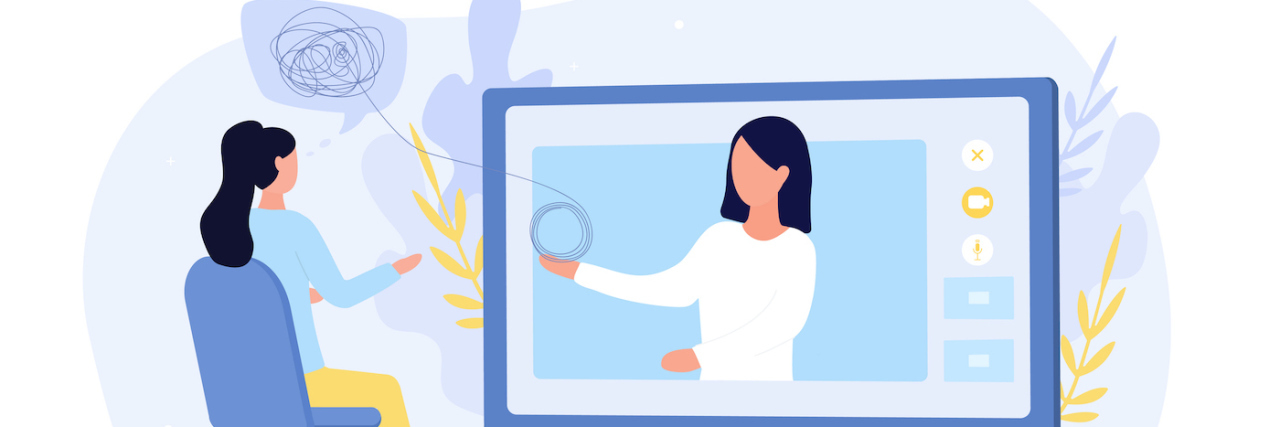When COVID-19 first spread around the world, I never expected it would impact the quality of therapy I receive. Unfortunately, though, the pandemic indirectly led to the breakup of my relationship with a therapist — and reminded me that above all else, therapists are human too.
A few months into COVID-19, I was part of a virtual mental health treatment program. I spent hours each day attending therapy groups, doing therapy homework and meeting with my program-assigned therapist. My therapist and I had a seemingly strong therapeutic relationship — she was firm but understandable and held me accountable for my actions. I appreciated how direct she was with me, and her approach seemed to sharpen my dialectical behavioral therapy (DBT) skills.
Until the day when our therapeutic relationship imploded, leaving me feeling angry, sad and completely lost. I was in a treatment group led by my therapist, and all was proceeding as usual — we did a mindfulness exercise and began discussing areas in our lives in which we need help using skills. I felt comfortable, safe and supported as my group mates and I discussed our everyday challenges. After each person finished talking, my therapist would type personalized DBT skill suggestions into the chat box in Zoom. But after one of the other clients finished talking, my therapist accidentally pasted a paragraph of personal information about a client into the box.
We were all horrified, and as she scrambled to delete the message, I contemplated whether or not to read it. Some keywords caught my eye — “anorexia nervosa,” “struggles with self-harm,” “suicidal,” “client is willful and resists adequate food consumption.” My jaw dropped as the realization hit me: those notes had to be about me. And for a few painfully uncomfortable seconds in time, those confidential clinical notes were visible to every single client in my therapy group.
Seething with rage, I muted myself and texted several of my treatment friends about the situation. When I confessed that I thought those HIPAA-protected notes were about me, one girl suggested that they might be about her instead — after all, we had the same therapist. But the sinking feeling in the pit of my stomach remained — I knew she had breached my confidentiality, and I needed to do something about it.
After the group ended, I called my therapist, hoping I could keep my composure amidst my anger. I left an enraged voicemail, insisting that she tell me if those notes were mine and demanding that she own up to her actions.
When she called back, I was in tears, desperately trying to hold myself together after feeling so violated. She admitted that the notes were mine and they were intended to be sent to insurance, and she apologized profusely. But even though she apologized for her actions, the damage had been done. I felt as though I could no longer trust my therapist to hold my thoughts, feelings and fears in confidence.
Two days later, when we had our next individual session, I still felt embittered, mistrustful and completely violated. When I confronted my therapist about some of the specific wording in the notes, its lack of objectivity, and the fact that everyone had seen those judgments when no one was supposed to, she initially tried to calm me down. But when I told her that some of the language sent to the insurance company was unflattering and judgmental of her to write, she accused me of calling her names — which I certainly didn’t do. Completely appalled by my therapist’s reaction, I told her that I felt like some DBT clinicians pin their own struggles with emotional regulation on their clients and that I felt this was happening at that moment. It was by far my worst moment as a therapy client, but my therapist’s actions had deeply upset me — and I knew my anger wasn’t my own fault in this circumstance.
It was then, as I wondered how I could possibly repair a therapeutic relationship shattered in a single instant that I learned the bitter truth: therapists are human too. Although they often remain composed in their sessions, therapists aren’t immune from feeling frustrated with their own mistakes and angry with their clients’ actions. They have hard days and “unskillful” moments, just like the rest of us. But what matters above all else is how they handle those moments with their clients — whether they take responsibility for their actions or foist it onto emotionally-charged clients instead.
Seeing my personal information leaked to multiple fellow clients and watching my therapist struggle to temper her own emotions as I confronted her reminded me that as much as we put our therapists on a pedestal, they aren’t infallible. Over a year later, I still haven’t forgiven this particular therapist for the ways she breached my trust and expressed her frustration with my actions, but I do understand why she snapped. I still carry the pain of that day deep inside my heart, but I know that any therapist could make the same mistake — how they respond to their error makes all the difference.
Getty image by Rudzhan Nagiev

